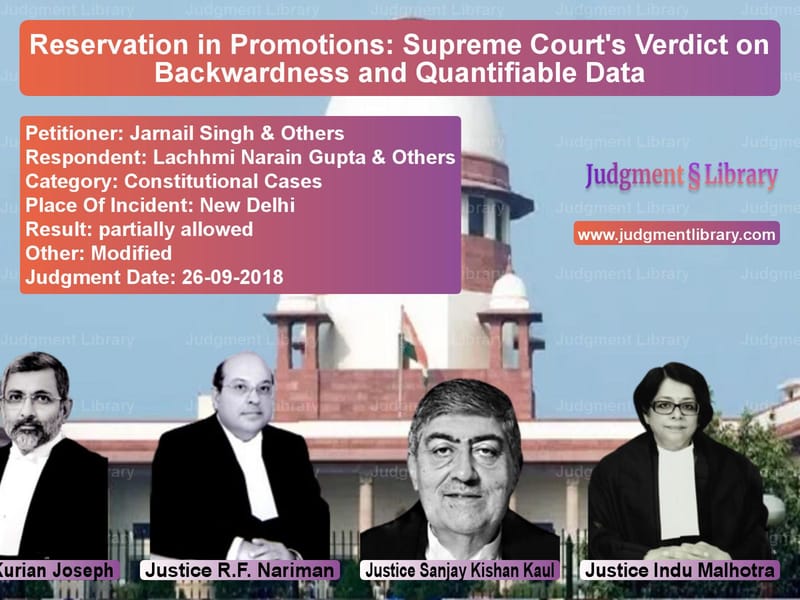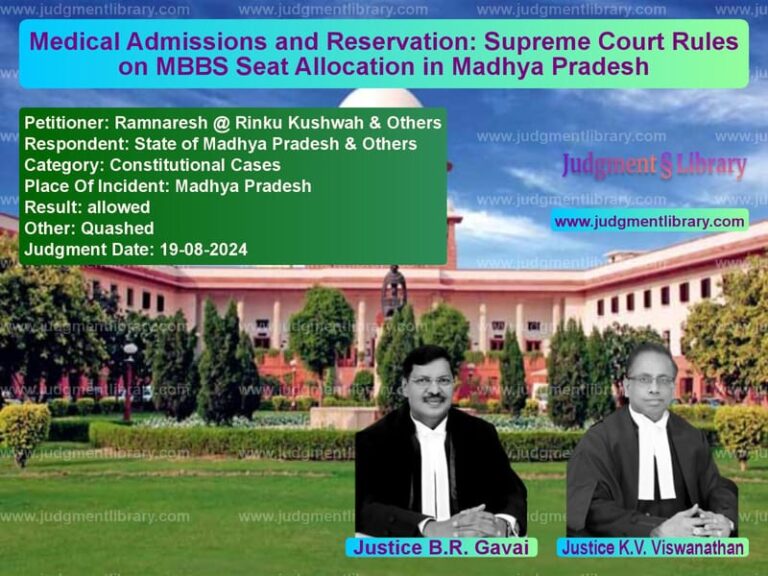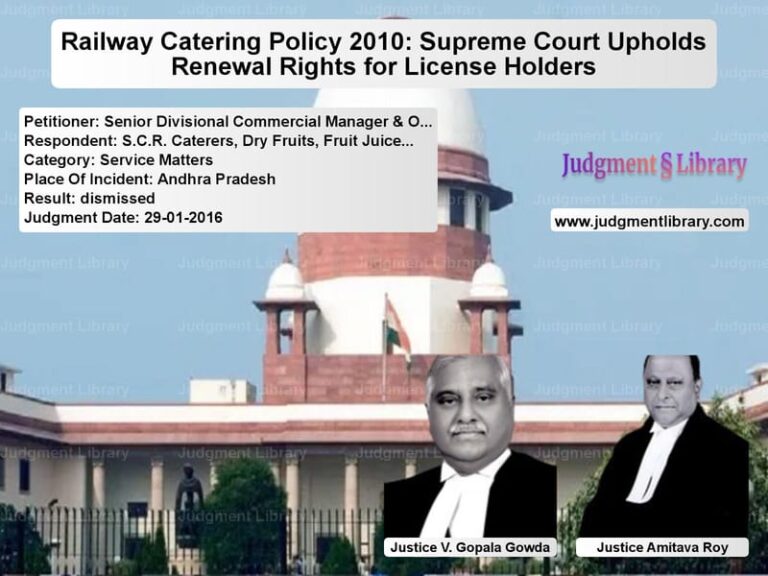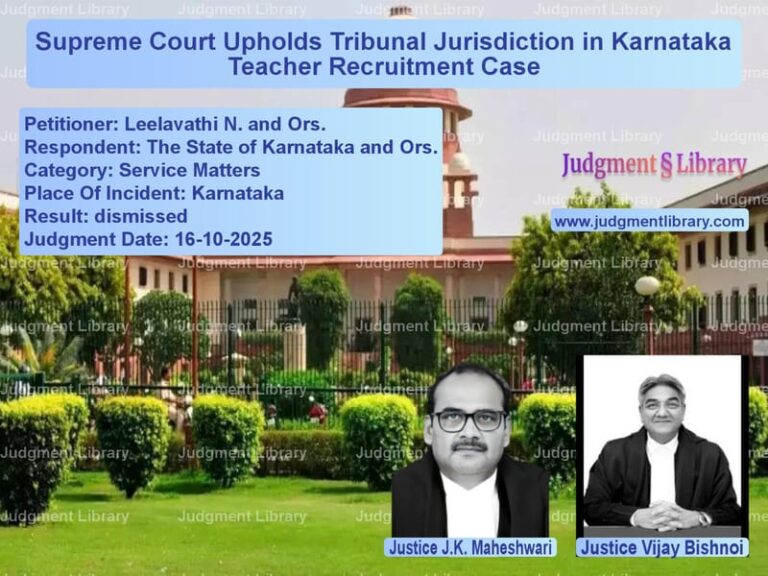Reservation in Promotions: Supreme Court’s Verdict on Backwardness and Quantifiable Data
The case of Jarnail Singh & Others vs. Lachhmi Narain Gupta & Others addressed a longstanding debate on reservation in promotions for Scheduled Castes (SCs) and Scheduled Tribes (STs). The Supreme Court examined the validity of requiring quantifiable data to prove the backwardness of SCs/STs while considering promotions in government services. This decision impacted affirmative action policies and addressed constitutional provisions concerning equality and social justice.
Background of the Case
The dispute originated from the Supreme Court’s earlier ruling in M. Nagaraj & Others vs. Union of India (2006), which held that states must collect quantifiable data proving the backwardness of SCs/STs before granting reservations in promotions. Several petitions challenged this requirement, arguing that SCs/STs were already recognized as backward by the Constitution and should not have to prove their backwardness repeatedly.
Key Legal Questions
The Supreme Court was asked to decide:
- Whether states need to collect quantifiable data proving the backwardness of SCs/STs before providing reservations in promotions.
- Whether the principle of the creamy layer should apply to SCs/STs.
- Whether the Nagaraj judgment required modification to align with constitutional principles.
Petitioner’s Arguments (Jarnail Singh & Others)
The petitioners argued that:
- The requirement of proving backwardness violates the Constitution, as SCs/STs are already identified as backward under Articles 341 and 342.
- The Nagaraj ruling ignored the fundamental distinction between backward classes and SCs/STs.
- Reservation in promotions is essential to ensure the representation of marginalized communities in government jobs.
- Applying the creamy layer concept to SCs/STs would dilute their rights under Article 16(4-A).
Respondent’s Arguments (Lachhmi Narain Gupta & Others)
The respondents contended that:
- The requirement of quantifiable data ensures fairness in promotions and prevents excessive reservations.
- Applying the creamy layer principle ensures that only the most disadvantaged members of SCs/STs benefit from reservations.
- The Nagaraj ruling was correctly decided and should not be overturned.
- Efficiency in administration should not be compromised by excessive reservations in promotions.
Judgment and Key Observations
The Supreme Court, comprising Chief Justice Dipak Misra, Justice Kurian Joseph, Justice R.F. Nariman, Justice Sanjay Kishan Kaul, and Justice Indu Malhotra, made the following key observations:
1. Requirement of Quantifiable Data: “The test or requirement of social and educational backwardness cannot be applied to Scheduled Castes and Scheduled Tribes, who indubitably fall within the expression ‘backward class of citizens.’”
2. Validity of the Nagaraj Judgment: “While the principle of quantifiable data is applicable to inadequacy of representation in government services, it is not necessary for proving backwardness, as SCs/STs are presumed to be backward under the Constitution.”
3. Application of the Creamy Layer: “The creamy layer concept is a facet of the equality principle under Articles 14 and 16(1). It applies to exclude individuals who have attained economic and social advancement from reservation benefits.”
The Court modified the Nagaraj ruling by removing the requirement of proving backwardness while retaining the necessity of demonstrating inadequate representation and maintaining administrative efficiency.
Impact and Significance
The judgment had major implications for reservation policies in India:
- Clarification on Reservation in Promotions: The ruling ensured that states do not need to collect backwardness data but must show inadequate representation of SCs/STs in services.
- Exclusion of the Creamy Layer: The decision affirmed that the creamy layer exclusion applies to SCs/STs, ensuring that reservation benefits reach the most disadvantaged members.
- Guidance for Future Policies: The ruling provided a framework for state governments to structure their affirmative action policies within constitutional limits.
Final Conclusion
The Supreme Court’s decision in this case reaffirmed the constitutional validity of reservations in promotions while ensuring that only the most disadvantaged sections within SCs/STs benefit from affirmative action. By striking a balance between social justice and administrative efficiency, the ruling provided a clear directive for future policies concerning reservations in government employment.
Petitioner Name: Jarnail Singh & Others.Respondent Name: Lachhmi Narain Gupta & Others.Judgment By: Justice Dipak Misra, Justice Kurian Joseph, Justice R.F. Nariman, Justice Sanjay Kishan Kaul, Justice Indu Malhotra.Place Of Incident: New Delhi.Judgment Date: 26-09-2018.
Don’t miss out on the full details! Download the complete judgment in PDF format below and gain valuable insights instantly!
Download Judgment: Jarnail Singh & Othe vs Lachhmi Narain Gupta Supreme Court of India Judgment Dated 26-09-2018.pdf
Direct Downlaod Judgment: Direct downlaod this Judgment
See all petitions in Fundamental Rights
See all petitions in Constitution Interpretation
See all petitions in Public Interest Litigation
See all petitions in Judgment by Dipak Misra
See all petitions in Judgment by Kurian Joseph
See all petitions in Judgment by Rohinton Fali Nariman
See all petitions in Judgment by Sanjay Kishan Kaul
See all petitions in Judgment by Indu Malhotra
See all petitions in partially allowed
See all petitions in Modified
See all petitions in supreme court of India judgments September 2018
See all petitions in 2018 judgments
See all posts in Constitutional Cases Category
See all allowed petitions in Constitutional Cases Category
See all Dismissed petitions in Constitutional Cases Category
See all partially allowed petitions in Constitutional Cases Category







